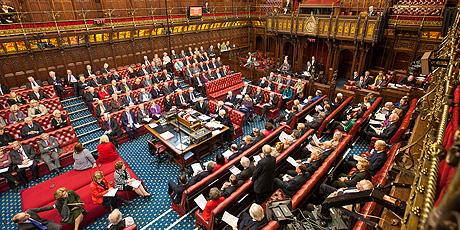Trade deal effects are wide-ranging and need democratic scrutiny

In a pivotal point for UK trade policy, last night the House of Lords voted for an amendment that would allow Parliament to set guidelines for trade deals and get a meaningful vote at the start and end of negotiations.
Trade deals can affect many areas of everyday life and domestic policy making.
As currently written, trade deals privilege corporate power, which makes the need for democratic control over these far-reaching deals obvious for those on the Left.
Thousands of citizens have been telling Parliament this for over a year. Business groups, trade unions, consumers groups and campaigners have been unusually united in saying it. Hundreds of MPs pushed for it, and Wednesday’s vote in the Lords delivers it.
The vote was particularly crucial because we know that the government planned to withhold any meaningful say over trade deals from our democratic representatives.
Just last week, we learnt that their proposals on scrutiny of trade policy contain dangerously inadequate democratic oversight.
New documents revealed plans for parliamentary procedures on trade that would leave MPs with no power at all to change the government’s course of action.
Parliament needs to be able to set guidelines for trade deals and get a meaningful vote at the end. And that’s what the amendment to the Trade Bill, put down by Labour and the Lib Dems with Crossbench support, requires.
Modern trade deals aren’t just about taxes on goods crossing borders any more. They impact on everything from food standards to climate to the NHS, and they can be immensely powerful, cutting through the rules and standards of our society like a juggernaut.
The need for basic democratic procedures to be put in place is clear. MEPs in Europe, and members of the US Congress get a vote on trade deals, so why shouldn’t MPs?
The need for trade democracy is more urgent than ever. The government is desperate to secure new trade relationships post-Brexit.
Negotiations between the Department for International Trade and the US are underway. The US published its negotiating objectives last week, and they are aggressive, containing so much that we feared.
They would undermine food standards – the notorious chlorine chicken would be the tip of the iceberg. They would further open up the NHS and other public services to private corporations and try to force the NHS to pay more for medicines.
The stated objectives even include a specific objective one on Israel aimed at forcing the UK to discourage boycott, divestment and sanction activities aimed at holding Israel to account for its responsibilities under international law. Objectives like these have no place in any trade deal.
Since the Trade Bill started making its way through the legislature in 2017, trade campaigners have consistently warned that the bill needs to set out an effective modern approach for democratic oversight of trade deals.
In a rare consensus, business groups, unions, consumer groups and campaigners have typically been united in saying a basic framework is needed.
This has been recognised by several parliamentary committees, including the International Trade Committee, who have set out the principles they believe are needed.
Without this latest amendment to the Trade Bill, and under the government’s latest proposals, trade deals would be negotiated under the royal prerogative.
Ministers would get to decide who to do deals with, however bad their human rights record, and what to put on the table – whether it is our public services or environmental standards.
They could do all of this behind closed doors without Parliament or the public knowing what is going on.
Parliament would not have been guaranteed a vote at the end, and even if it was able to secure one, could only delay a trade deal, not reject it. It also wouldn’t have even been able to ask for changes to improve it.
The government is basically happy to continue with this. It offered to share information that it chooses with a parliamentary committee – but without the committee being able to require them to disclose documents.
They have said they will publish written objectives for a deal – which is a step forward from the recent comedic situation where parliament was given a debate on a future trade deal with the US and others, without being given any information on what the government’s plans for such a deal would be.
However, parliament would have had no right to debate or change this. All of this would have been abe a woefully inadequate process for a modern democracy.
Yesterday’s vote finally provides the basic democratic framework for trade that should be a minimum standard in a modern democracy.
However, we know the government would prefer to continue with their secretive approach and are likely to try and overturn it in the final stages of the Trade Bill’s passage.
The House of Lords’ vote was a critical step in the campaign for trade democracy. Where the government had failed so far, peers have drawn a line: trade deals and policy are too important to be decided behind closed doors – we must have democratic processes in place to stop governments from signing away our rights. It is essential that this democratic framework is defended in the Commons.
We can’t hope to improve trade deals to ensure they work for people and planet unless the people and their representatives in Parliament have a say.
Tim Chuah is a communications officer at War on Want
Left Foot Forward doesn't have the backing of big business or billionaires. We rely on the kind and generous support of ordinary people like you.
You can support hard-hitting journalism that holds the right to account, provides a forum for debate among progressives, and covers the stories the rest of the media ignore. Donate today.



